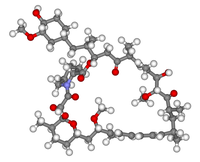
Photo from wikipedia
Among all cancers, hepatocellular carcinoma (HCC) remains a lethal disease with limited treatment options. In this study, we have analyzed the possible inhibitory effects of Fangchinoline (FCN) on c‐Met, a… Click to show full abstract
Among all cancers, hepatocellular carcinoma (HCC) remains a lethal disease with limited treatment options. In this study, we have analyzed the possible inhibitory effects of Fangchinoline (FCN) on c‐Met, a protein known to regulate the rapid phosphorylation of downstream signals, as well as mediate aberrant growth, metastasis, survival, and motility in cancer. FCN inhibited the activation of c‐Met and its downstream signals PI3K, AKT, mTOR, MEK, and ERK under in vitro settings. Moreover, c‐Met gene silencing lead to suppression of PI3K/AKT/mTOR and MEK/ERK signaling pathways, and induced apoptotic cell death upon exposure to FCN. In addition, FCN markedly inhibited the expression of the various oncogenic proteins such as Bcl‐2/xl, survivin, IAP‐1/2, cyclin D1, and COX‐2. In vivo studies in HepG2 cells xenograft mouse model showed that FCN could significantly attenuate the tumor volume and weight, without affecting significant loss in the body weight. Similar to in vitro studies, expression level of c‐Met and PI3K/AKT/mTOR, MEK/ERK signals was also suppressed by FCN in the tissues obtained from mice. Therefore, the novel findings of this study suggest that FCN can potentially function as a potent anticancer agent against HCC.
Journal Title: Phytotherapy Research
Year Published: 2022
Link to full text (if available)
Share on Social Media: Sign Up to like & get
recommendations!